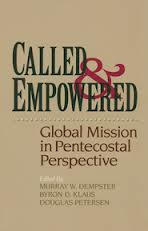Called & Empowered
 Called & Empowered is a collection of essays that addresses a number of critical post-modern issues. The main purpose of the book is to introduce and answer problematic questions related to church and culture. A great addition is the compilation of in-depth cultural studies and recent theological developments viewed in Christian context. What made the book interesting for me personally was the presence of a number of well-balanced critical perspectives which were presented from different viewpoints. Because they were combined with different cultural factors, they were helpful in understanding the Global Mission of Pentecostalism. The supportive evidence focused on the Kingdom, culture, social formation and unity.
Called & Empowered is a collection of essays that addresses a number of critical post-modern issues. The main purpose of the book is to introduce and answer problematic questions related to church and culture. A great addition is the compilation of in-depth cultural studies and recent theological developments viewed in Christian context. What made the book interesting for me personally was the presence of a number of well-balanced critical perspectives which were presented from different viewpoints. Because they were combined with different cultural factors, they were helpful in understanding the Global Mission of Pentecostalism. The supportive evidence focused on the Kingdom, culture, social formation and unity.
On the Kingdom of God
During the latter part of the twentieth century, the doctrine of the Kingdom of God was of great concern for many theologians and missiologists. In my short educational experience, I have been introduced to a number of works on the subject, some of which were quite controversial. However, it has been interesting to read about the Kingdom strategy of Jesus, along with the development of the Kingdom theology in the context of third world praxis. It seems that in both cases, it is reasonable to accept the fact that since the Kingdom of God was a prime concern in the ministry of Jesus, as well as in the ministry of John the Baptist and the apostles, it should carry the same importance in our Christian life and activities. Unfortunately, this may not be the observed reality in Christianity today. However, traditionally and historically, Pentecostal Christians have always focused on the Kingdom of God. A very particular example in this case is the already-not-yet proposal, which is directly associated with Kingdom theology.
On Gospel and Culture
This particular division in Called and Empowered has a very important discussion on the urbanization of the Pentecostal mission. Historically, Pentecostal revivals do not begin in huge urban centers and do not focus or attract them. It seems that such revivals occur mainly among people who are neither highly educated, nor economically prosperous. Also they do not occupy a high rank in the social hierarchy. It is only after they have had a period of successful existence as aggressively growing religious organizations that the Pentecostal Churches and ministries start aiming at the great cultural, economical and political urban centers. Such progressive development is evident in the Bible. Undeniably, the first move of the Holy Spirit in Acts 2 was among uneducated people such as fishermen and tax collectors. Similar concern was expressed by Gentiles present in Jerusalem on the day of Pentecost. Nevertheless, shortly thereafter the Gospel was preached before kings, politicians, governors and military leaders. Therefore, what Pentecostalism rediscovers today is not a new blending of culture and Gospel, but rather a reclamation of the continuity of historical inheritance.
On Pentecostal Response to Marxism
A very good point was made by Dr. Kuzmic in his exposition on Marxism in relation to the existence of Pentecostalism. It is always quite disturbing when a parallel between Marx’s socialism and Christianity is being made. In Eastern Europe however, this idea is not as neoteric as proposed by some Western writers. In the early twentieth century Nikolay Berdyaev, one of the most prominent socialist writers, introduced what is considered probably the first comparison between Christianity and Marxism. The similarities are many: common wealth, economical and social balance, peace, brotherhood, ect. Also, communism in many ways imitates Christianity. Good examples are the establishment of the social and economical infrastructure of cultural communes, work unions and agricultural cooperatives which have common assets. A similar example is the almost “religious” dedication required by the Communist Party.
What is missed, however, is the simple fact that Marxism, different from Christianity, lacks God. As Dr. Kuzmic points out, Marx hated all gods, including Christ. Therefore, there is no room for comparison. If Communism is Christianity without Christ, it then stands far away from the whole idea of the existence of Christianity. This was shown through the enormous failure of communism in Eastern Europe. Since Dr. Kuzmic has personally experienced all of the above, his exposition on Marxism in relation to Pentecostalism assesses the true danger of such a parallel.
On Ecumenism and Pentecostal Mission
The last evidence is drawn from the discussion on Ecumenical Mission offered in Called & Empowered and my long-term relationship with the World Council of Churches. The World Council of Churches is one of the numerous organizations which promote worldwide Christian unity through reconciliation, theological dialogue, sharing of resources and the vision of a community life rooted in a particular cultural context.
The vision of the World Council of Churches is based on the common Christian mission of introducing Christ and Christianity to the world. I am persuaded that the future of World Missions is for Christians uniting with a common purpose for our Christian mission. Undoubtedly, such process will take time and mutual efforts. I am reminded of this as I observe my home country, Bulgaria where Protestant Christians are divided against one another and unity is lacking. Unified missions will not only bring oneness and harmony back into the church, but it will formulate the ecclesiastical community after the image of the Early Church from the Book of Acts. The results from such a unified mission will not only be world changing, but self-changing as well.
Mission Applications
The following part of this overview will include a mission application response to the evidences listed above. As it focuses on the Eastern European context, it will further suggest mission applications in the present Protestant reality in the region, and more specifically among the Bulgarian Pentecostals. The above four evidence accents were chosen among others because they all pertain to today’s Bulgarian Protestant reality. The kingdom of God as both present reality and eschatological hope takes a bit different perspective in a society where forty five years of Communist regime has left a deep scar on people’s mentality. Healing for the emotional and social wounds has not been provided by rapidly changing governments and political models, crime has increased, severe economical crises have occupied and there remains a constant fear and lack of hope for the future. In such context, the Kingdom of God is much more than a present reality or a future hope. It is all that the Protestant church in Bulgaria really has.
Gospel and culture are an essential part of Bulgarian missions work. On the Balkan Peninsula where Bulgaria is located, there are more than 150 languages and dialects spoken. Adding the crossroads of three world religions, three continents and constant migration of people that has been going on for thousands of years, makes this Europe’s melting pot of cultures and ethnoses. Discovering a paradigm which will serve as a buffer between the ever-changing Balkan culture and the eternal Gospel will be the ever-present factor that determines the success of Protestantism on the Balkans.
In Eastern European cultural and social context, the mentioning of Communism indeed has a different meaning. The Pentecostal church in Bulgaria historically and ideologically has opposed Communism in every form, and thus Pentecostal Christianity in Bulgaria must differentiate from Communism in order to remain in its historical distinctives. In order to be successful in its mission and message, and at the same time remain within its original identity, the Bulgarian Protestant movement must continue to oppose Communism in all of its forms.
The final evidence of ecumenism must be understood in Eastern European settings not only as an ecumenical cooperation of different religious formations, but as a union between all existing Protestant groups. As costly as such idea may seem, it will strengthen Eastern European Protestantism. Historically, in Bulgaria an organization called Bulgarian Evangelical Alliance (United Evangelical Churches) has served such purpose by preserving the identity of the denominations members. Such unity of cooperation must continue in even more strategic and planned ways in order to provide Bulgarians with the proper social context for national Protestant reformation and revival.
Mission Bulgaria 2005-2012 Completed
 We are currently finalizing our Mission Bulgaria project through a seven-year long commitment, which has touched the lives and ministries of over 250 local churches in the country of Bulgaria. Along with these congregations, our international ministry team has worked with the Bulgarian Diaspora churches in the United Kingdom, Cyprus, Spain, Germany and France. Six Bulgarian churches are currently operating in Cyprus and four in the U.K., as there are projections for the registration of other Bulgarian churches as well. It has been a journey worth taking.
We are currently finalizing our Mission Bulgaria project through a seven-year long commitment, which has touched the lives and ministries of over 250 local churches in the country of Bulgaria. Along with these congregations, our international ministry team has worked with the Bulgarian Diaspora churches in the United Kingdom, Cyprus, Spain, Germany and France. Six Bulgarian churches are currently operating in Cyprus and four in the U.K., as there are projections for the registration of other Bulgarian churches as well. It has been a journey worth taking.
In relation to our ministry work in Bulgaria in the period of 2005-2012, among many others we’ve completed these seven milestones:
1. The publication of a complete revision of the Bulgarian Bible
2. Completing a new literal translation of the Bulgarian New Testament from the original Greek including the four gospels, acts, epistles, and the apocalypse
3. Establishment of the Bulgarian Chaplaincy Association with the special recognition of the US Department of State
4. Foundation of the Masters of Chaplaincy Ministry Program for Eastern Europe
5. Our national X event for youth every summer since 2005, which is accompanied with a Bible Camp for young ministers and a national mobile educational strategy
6. Building a broadcasting network which supports LIVE streaming of services and events for over 20 Bulgarian congregations every week
7. Implemented a long-term church planting proposal for establishing Bulgarian ethnic congregations outside of Bulgaria
After completing 7 years of ministry in Bulgaria, we are publishing a detailed overview of our work and results in a soon to be published monograph called simply Confessions. This new book speaks of the lessons we’ve learned in the ministry and issues of church and politics within the religious life of the country we’ve struggled to resolve. It addresses:
- The separation of church and politics of false religiosity
- Entering an organic relationship with God
- Depending fully in the ministry of the Holy Spirit
- Renvisioning the reality of the Kingdom
- Raising a new Pentecostal generation
- Reliving His glory
- Leaving a legacy worth remembering
As we are celebrating our 7-year long accomplishment of Mission Bulgaria, we are reminded that in 2013 God is doing a new thing.







